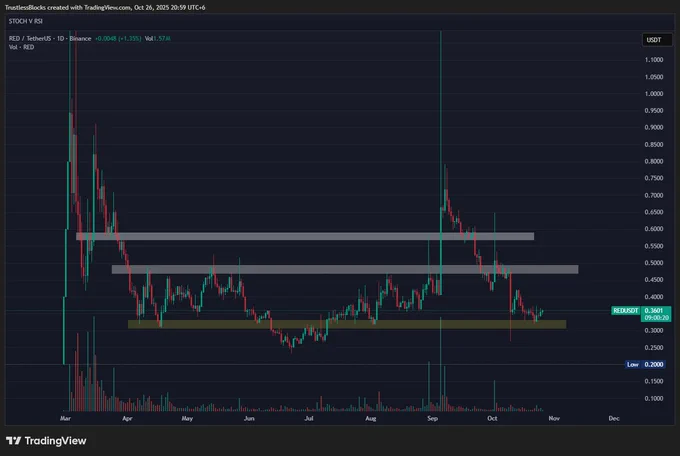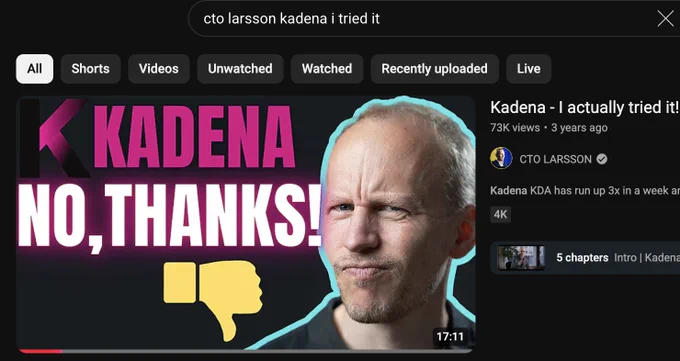Krypto nerd @redstone_defi @peaq @movementlabsxyz @karrier_one Co-founder: @On_ChainersBD
Joined January 2012
- Tweets 3,707
- Following 1,470
- Followers 581
- Likes 6,677
Pinned Tweet
I am pleased to reflect on the significant progress of @redstone_defi oracle, since I shared a thread on its TVS via my alternate handle on August'23.
At that time, RedStone's TVS was at ~$24m. Today, as of Sept'25, the oracle has achieved an impressive approx 400% increase in TVS (~9B) driven by the integration of numerous leading DeFi projects.
The Redstone team has demonstrated a consistent and accelerated growth trajectory, markedly more active than in 2023. The expansion of the team and integration with valuable projects has been key factors in this success, enabling enhanced development and strategic partnerships throughout almost all chains in web3.
The introduction of the $RED token has further bolstered the ecosystem, providing new opportunities for engagement and investment within the community. Notably, RedStone is now positioning itself as a competitive player against industry giants #Chainlink, which was tough to imagine that time.
Having been part of the community from its early stages, I am particularly proud of how far #RedStone has come in such a short period. I was there, I am here and I will be there. #OGMiner
Thank you, @MarcinRedStone
As of August 21, 2023, #RedStone has a total value secured (TVS) of $23.29 million. The majority of this TVS is from the CIAN protocol.
Stoney's soaking up those beach vibes and @redstone_defi keeps the data flowing non-stop, no matter if the market's mooning or crashing!
Reliable oracles for DeFi pros, always on point.
DarkD♦️ retweeted
NEAR has successfully completed its halving upgrade on mainnet.
This upgrade reduces the maximum annual inflation rate of NEAR Protocol from 5% to 2.5%, ushering in an era of more sustainable tokenomics and strengthening incentive alignment across the NEAR ecosystem.
DarkD♦️ retweeted
RedStone has been the official blockchain oracle supporting Securitize and all tokenized products.
We have witnessed how hardworking and clever they are.
Big day and respect @carlosdomingo @jserna @thedukekim @GeorgiaQuinnEsq @TomMurphyTweets and the whole team 👏
DarkD♦️ retweeted
x402 payment protocol is 🔥, but wait until peaq brings Universal Machine Payment.
70% of the world's economy is rooted in the physical world and the robots are arriving.
peaq Robotics SDK will give them economic autonomy through trustless, risk-free payments. Robots GMI.
DarkD♦️ retweeted
Everyone’s losing their minds over x402 and pumping every shitcoin vaguely related to it.
Meanwhile, peaq integrated that already weeks ago, powering autonomous payments amongst agents and machines.
peaq keeps pioneering the (physical) AI sector, lesson in there.
DarkD♦️ retweeted
What x402 actually does
Explained in very simple terms:
x402 brings payments directly into HTTP.
Meaning:
A website, API, or agent can say:
“This costs $0.01 USDC. Pay to continue.”
Your browser or AI agent pays instantly.
Just: request → pay → receive.
Money moves like a web request.
Internet + native payments.
It’s not a new blockchain.
Just using the rails we already use every day: HTTP.
And behind it, there’s one person you should know:
Erik Reppel.
Who he is:
• Canadian, ~29
• Grew up in Port Moody, British Columbia
• Studied Software Engineering at the University of Victoria
• Won Hack The North, the biggest hackathon in Canada
• Moved to San Francisco
• Spent years building ML systems inside Coinbase
• Built the data + infrastructure layer at Zora
• Briefly worked at Clubhouse during its peak
• Returned to Coinbase in 2025 as Head of Engineering for the Developer Platform
The internet is going from humans clicking pages to agents doing tasks for us:
• Research agents
• Shopping agents
• Data-fetching bots
• AI assistants that call APIs
• Autonomous workflows talking to each other
These agents need to pay for things:
• Data
• Compute
• Storage
• Tools
• Premium endpoints
• Other agents
But agents cannot:
• Enter credit card details
• Create accounts
• Pass KYC
• Confirm payments manually
They need to pay programmatically.
Instantly.
Safely.
Without friction.
x402 is exactly for this moment.
Who already integrated it
• Cloudflare → integrated into their global network (78M+ requests/sec)
• Google → if Google agents call an API, they can settle with USDC on Base/Solana
• Visa → x402 used for settlement
Real usage (not theory)
Right now it’s already being used for:
• Paying $0.01 to fetch Farcaster data through Neynar
• Paying per scrape request on Firecrawl
• Storing and retrieving media on Pinata with no account
• AI agents buying compute in small increments
• Content unlocks directly in the browser
• Micro-APIs that charge fractions of a cent
How Erik thinks:
“Value should move across the internet as easily as information.”
He believes:
• The future internet is machine-native
• Agents will transact with each other
• Subscriptions are inefficient
• Static pricing breaks when machines negotiate
• Web needs a stable, neutral, open payment standard
Maybe we’re seeing the beginning of a new era in crypto:
AI Agents that can pay.
What do you think?
Redstone and @Kalshi have forged an epic alliance, unleashing real-time prediction market data across 110+ chains! From election shocks to rate-cut rumbles.
Stoney, redstone's wizard mascot, clutches the most precious prediction stone, foretelling chaos and opportunity!
REDSTONE x KALSHI
JUST IN: @Kalshi partners with RedStone to power its onchain markets with real-time oracle data across a wide range of contracts.
This makes Kalshi’s data layer accessible on 110+ chains, creating a greenfield for developers.
Prediction markets just opened to builders 🧵
In 2021, moinbois and shillers compared $KDA with $SOL😂
Redstone Bolt is oracle service that provides near-instant price updates to dApps on high-speed blockchains.
It is the fastest oracle, delivering updates every 2.4ms, and uses a "push" model that proactively sends data to the blockchain instead of waiting for requests, making it ideal for high-performance chains .
✅Ultra-fast speed
✅Push model
✅Compatibility
✅Targeted for high-performance chains
✅Real-world data integration































